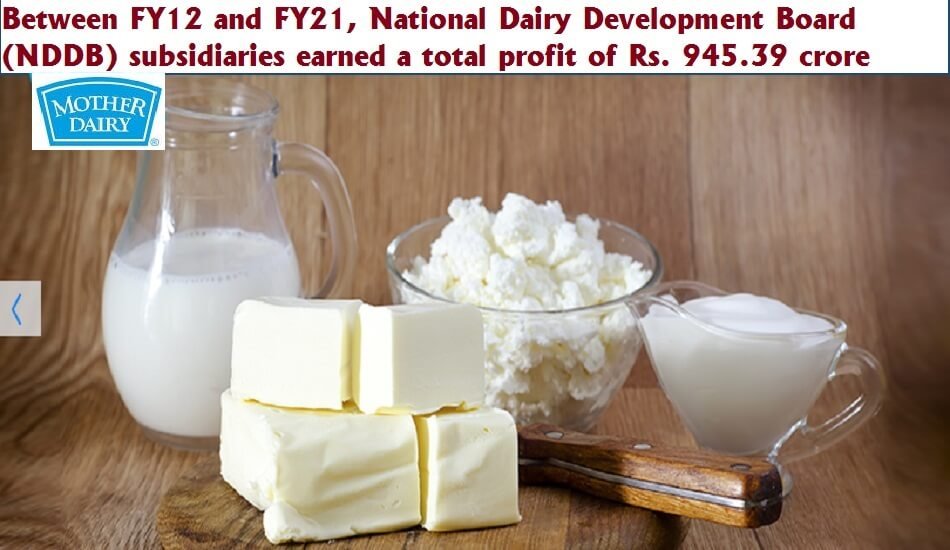NDDB’s subsidiaries earned a total profit of ₹945.39 cr, Mother Dairy contributed ₹295.10 cr
Between FY12 and FY21, National Dairy Development Board (NDDB) subsidiaries earned a total profit of ₹945.39 crore, with India Immunologicals contributing the most at ₹537.03 crore. Mother Dairy Fruit and Vegetable Pvt Ltd, among others, have contributed ₹295.10 crore.
This information was submitted in response to a query in the Lok Sabha about the losses incurred by NDDB subsidiaries over the last ten years.
According to Narendra Singh Tomar, Union Minister for Agriculture and Farmers Welfare, Mother Dairy Fruit and Vegetable Pvt Ltd lost ₹97.55 crore in FY19 and ₹164.40 crore in FY20. Also Read | NDDB signed MoU with UP to manage Varanasi Dairy Union for next five years.
Indian Immunologicals Ltd (IIL), another NDDB subsidiary that operates in the veterinary and human biologicals segments, lost ₹44.01 crore in FY16. IIL is a prominent player in India’s human vaccination business, focusing on pediatric and rabies vaccines. IIL also maintains one of the world’s largest veterinary vaccine manufacturing factories.
Indian Dairy Machinery Company (IDMC) Ltd, another subsidiary of NDDB, lost ₹13.07 crore during FY13. IDMC Ltd’s cumulative profit after tax was ₹109.90 crore from FY12 to FY21. IDMC was founded to produce dairy equipment and components.
From 2011-12 to 2020-21, NDDB Dairy Services, an NDDB Section 8 (not-for-profit) firm, earned a total of ₹3.35 crore in excess of income over expenditure (after-tax).
Tomar stated that the losses sustained by the subsidiary companies in one or two years are not unusual given the market trends. ‘In fact, each of the subsidiary enterprises has generated a cumulative profit/excess of income over expenditure during the last ten years. The cumulative profit after tax/excess of income over expenditure for all four subsidiary companies during this time was 945.39 crore,’ he said.
Honey
In response to a separate question about the National Beekeeping and Honey Mission (NBHM), Tomar stated that approximately 12,000 beekeepers/beekeeping and honey societies/firms/companies with 18 lakh honeybee colonies have registered with the National Bee Board (NBB) on the Madhukranti portal under the NBHM.
Furthermore, from 2017-18 to 2021-22, Khadi and Village Industries Commission (KVIC) registered and benefited 16,335 beekeepers through their ‘Honey Mission’ scheme (up to March 25).
The Minister stated that honey output in India has been projected at 1.25 lakh tonnes based on the third advanced estimate data.
Arecanut
In response to a question about yellow leaf disease (YLD) in arecanut plantations, the minister stated that YLD in arecanut is caused by phytoplasma. YLD has been observed in all districts of Kerala as well as six taluks in Karnataka. Karnataka and Kerala governments have taken certain initiatives to monitor and control the disease.
Tomar stated that the Arecanut Task Force Committee, formed by the Karnataka government, has entrusted MS Ramaiah University of Applied Sciences, Bengaluru, with studying the health implications of arecanut intake and its alternate usage.
ICAR-CPCRI is partnering with medical institutes such as Mangaluru’s KS Hegde Medical Academy to produce value-added products based on the anti-bacterial capabilities of arecanut. According to him, the Kerala Agriculture University is also conducting research on the usage of arecanut.
Also Read | NDDB launched e-GOPALA app for dairy farmers to know real-time info.
Cereals
In response to another question, Tomar stated that government agencies procured 939.62 lakh tonnes (lt) of grains, comprising wheat, rice, and coarse cereals, through March 28 of 2021-22, compared to 1003.54 lt in 2020-21. The purchase of pulses was 10.31 lt till March 28 of 2021-22, compared to 22.57 lt in 2020-21.
Onion
In response to a second question about the capacity of low-cost onion storage in the country, the minister stated that the present capacity of low-cost onion storage in the country is 10.27 lt. According to him, the country possesses 41,076 low-cost storage structures.
Under the Mission for Integrated Development of Horticulture, a back-ended subsidy of 50% of the entire cost of a 25-tonne capacity with cost parameters of ₹1.75 lakh per unit is available for the establishment of low-cost onion storage, he added.


















Add Comment